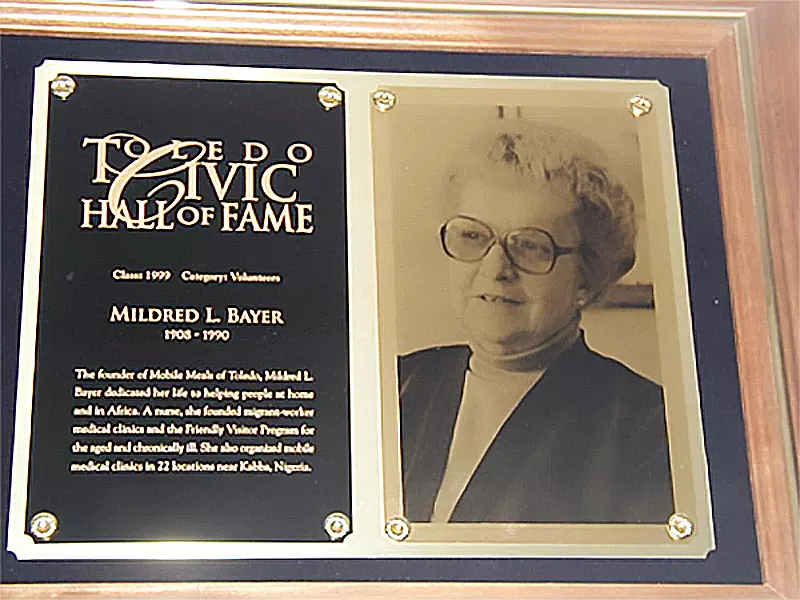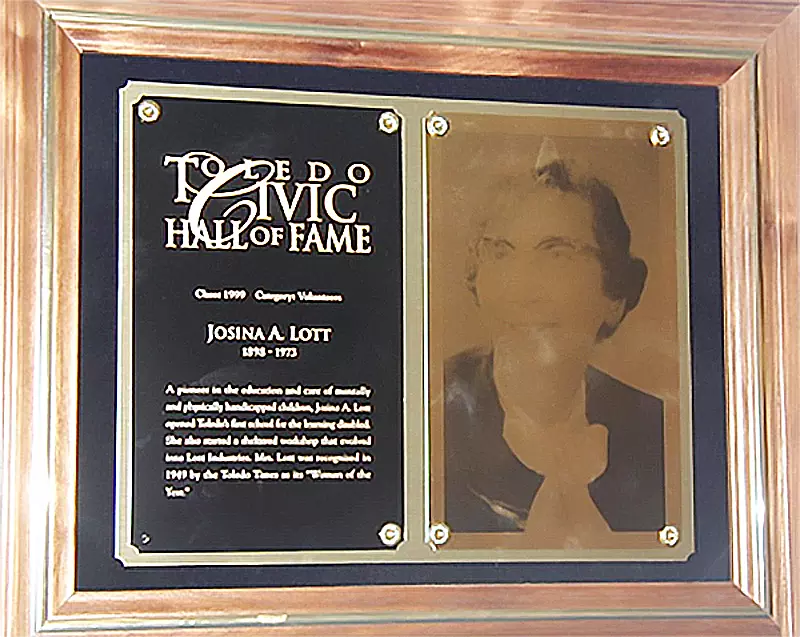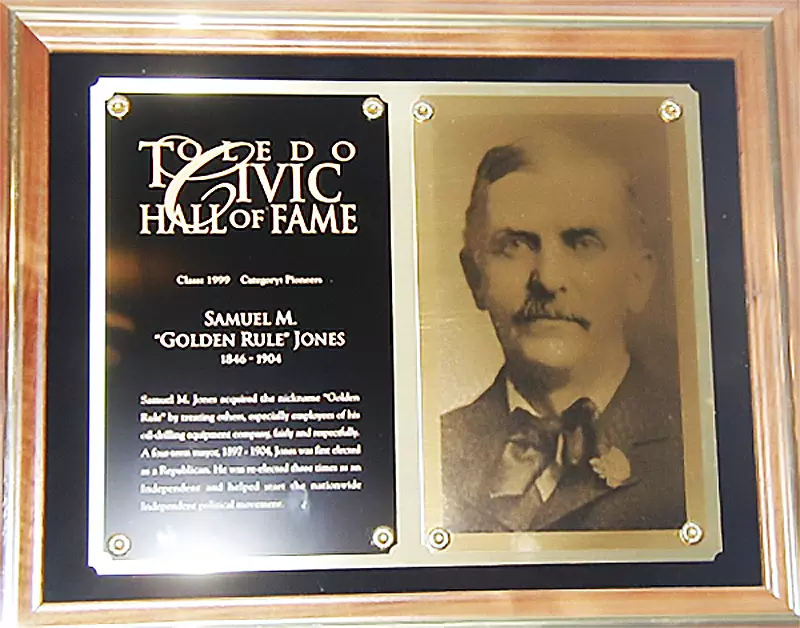1999 Inductees
Mildred Bayer (1908-1990), Volunteer
Mildred (Mason) Bayer was born in Weston, Ohio and received her nursing degree from St.Vincent School of Nursing in Toledo in 1932. She married Dr. Charles A. Bayer and adopted three children. In 1960, she began two medical clinics for migrant workers in Lucas County, and was instrumental in the founding of Mobile Meals of Toledo in 1967. She served as its first coordinator and later chaired the Mobile Meals Steering Committee and Task Force. She also started the Friendly Visitor Program for the aged. Following her husband's death in 1968, she spent sixteen months in Nigeria, doing medical work in a mission run by the Grey Nuns of Toledo. Upon returning to Toledo she raised a half million dollars to purchase medical supplies for the mission. She also served as president of the Little Flower Alter and Rosary Society, the Diocesan Council of Catholic Women, St. Anthony Orphanage League, and the Toledo Education Association for Aged and Chronically Ill.
Josina Lott (1898-1973), Volunteer
Josina (Jones) Lott was born in Alanson, Michigan and got her teaching degree from Ypsilanti State Normal College. She taught in various Michigan and Ohio elementary schools before coming to Toledo in 1938. She was disturbed to find the public schools turning away children with retardation and severe learning disabilities. When her son, Jack, was seven months old, she started a day school in her basement with four students. A year later, she was asked by more parents to teach their children and she expanded into Rosewood Presbyterian Church. After requesting help from the Board of Education and Chamber of Commerce, Lott Day School formed in 1945 and moved to a building at Kelsey and Heffner Streets. Lott asked the school auxiliary for money to open a sheltered workshop to employ students who had matured but were unable to find work. This was one of the first programs in the nation for vocational training of the developmentally disabled. A tax levy approved by voters in 1957 funded a merger of the Lott School with a countywide system of schools for children with cognitive disabilities. Lott remained as principal. In 1965 the Lucas County Sheltered Workshop for Retarded Persons opened. Lott Industries continue to employs over 900 persons. Lott retired at age 70 when she reached compulsory retirement age. She was also active in local, state and national organizations for the developmentally disabled. Her untiring work earned her the Toledo Times Woman of the Year Award in 1949 and the informal title "Toledo's Miracle Worker".
Samuel M. Jones (1846-1904), Pioneer
Born in Wales, young Samuel emigrated to American when three years old. His formal education was limited and he went to work at an early age. Working in the oil fields of Pennsylvania, he developed an interest in drilling technology. In 1894, he moved to Toledo and began a successful business making oil well appliances. He was distressed by the misfortune of his employees who had nothing but their labor to sell, and resolved that they would share his profits. A tin sign with the Golden Rule was erected in his shop, accompanying an eight-hour day, a week's vacation and a Christmas bonus. He encouraged his employees to unionize and marched with them in Labor Day parades. Still disturbed at class divisions, he built a playground for his workers' children and arranged for band concerts. His actions resulted in notoriety. In 1898, when Toledo Republicans sought a neutral mayoral candidate to unite factions in their party, they asked Jones to run. After he was elected, Jones surprised even his own party by insisting on a bipartisan administration and refusing to replace competent officials already in office. He created a parks system and replaced police billy clubs with white gloves. In 1899, knowing that political bosses would not re-nominate him, he demanded a direct political primary and a convention. After convention delegates were paid to nominate his opponent, Jones ran as an independent. On Election Day, Jones won by 16,773 votes to the Republican challenger's 4,266 and the Democrats' 3,125. The "Golden Rule Mayor" served into his fourth term, and was constantly embroiled in fights with the newspapers, clergy and the traction company (over trolley fares). He died from pneumonia while throngs of well-wishers kept vigil outside his house.
Brand Whitlock (1869-1934), Pioneer
Brand Whitlock is widely remembered for his political, literary and diplomatic achievements. He was born in Urbana, Ohio in 1869. He moved about Ohio with his minister father, attended high school in Toledo, and pursued his love of writing by writing for the News-Bee and The Blade. He continued working for papers in Illinois, until he turned to law and moved to Toledo in 1897, earning only enough to enable him to write. Whitlock's remorse at sending an innocent man to the workhouse spawned his sympathy towards the accused and halted his future as a prosecutor. He admired Mayor Sam Jones' intolerance for government corruption, and went to work for Jones as counsel. He also served as substitute for city judge, always showing leniency for the poor, and earning the title "The Great Suspender" along with contempt from the press. When Jones died, Whitlock declined to run for mayor, wanting instead to pursue his writing. He ran in 1905 and won his first of four mayoral terms. Opposed by the clergy and upper class, supported by the poor and emigrants, Whitlock held corruption at bay and pressed for modest reforms. He planned to find time to write after leaving office, and asked for a diplomatic appointment from then-President Woodrow Wilson, whose campaign he had aided. His appointment as minister to Belgium - a quiet, cultured, neutral country - appeared to be the respite he longed for. Ten months later, Belgium was invaded by Germany. While most diplomats fled, Whitlock remained and led relief efforts, earning him Belgium's love and gratitude. He left in 1917, as the United States prepared to enter World War I and broke ties with Germany. Whitlock spent his remaining years in Europe, finally indulging in his writing. His books earned modest praise from critics. Although Whitlock left his mark in many areas and earned much recognition in Europe, he considered his lack of greater literary success a personal failure.
Virgil Gladieux (1908-1997)
Gladieux grew up one of twelve children on his family's farm in Indiana. He moved to Toledo when he was seventeen to start a vending machine company. Aided by his wife and brother, his business grew during the Depression, providing in-house food service for companies including Jeep, Champion Spark Plug, and Libbey-Owens-Ford. In the 1950's, his company expanded to serve turnpikes, airports and universities. Gladieux was very active in civic affairs. He served on numerous boards, including hospitals, and school, arts, and community groups. As president of St.Vincent Medical Center, he brought the first life-flight helicopter to the hospital. A sports enthusiast, Gladieux built the Toledo Sports Arena with some friends and investors. He put together an NBA basketball team called the Toledo Jeeps, and brought IHL hockey to Toledo.
Monsignor Jerome E. Schmit (1910-1997)
Monsignor Schmit graduated from St. John's High School in his native Toledo. He attended the seminary in Worthington, Ohio, but was discouraged from pursing the priesthood because of a speech impediment. He found employment as a social worker during the Depression. Eventually he returned to seminary, and in 1941 was ordained as a Catholic Priest, launching his career serving Toledo's youth. Working for Catholic Charities of Toledo, Monsignor Schmit started with $27.00 and eventually organized Boy Scout and Girl Scout troops and 600 basketball teams. In 1942, he became director of the Catholic Club, which he served for nearly forty years. Pursuing greater recreational opportunities for all, he participated on the Lucas County Recreation Committee which established the Lucas County Recreation Center. Monsignor Schmit was secretary-treasurer of the Recreation Center until his death. When the Recreation Committee brought the Mud Hens to Toledo, he served as secretary-treasurer of the franchise.
John David Biggers (1888-1974)
John Biggers was a business leader and served in a variety of national governmental posts. Born in St Louis, he graduated from the University of Michigan and moved to Toledo in 1911 as secretary of the Toledo Chamber of Commerce. He joined Owens Bottle Company in 1914, and held increasingly responsible positions in production, financial, and sales departments there. In 1926 he moved to England to direct Dodge Brothers Britain Ltd, owned by Joseph and Ray Graham. He returned to New York and worked for the Grahams' other business interests, which included Libbey-Owens Glass. He came to Toledo in 1930 as president of the newly formed Libbey-Owens-Ford Corporation. He became chairman and chief executive officer in 1953 and finance committee chair in 1960. The company achieved enormous growth under Biggers' leadership. At the request of President Franklin D. Roosevelt, Biggers led the first ever-national unemployment census in 1937. He directed the U.S. Office of Production Management from 1940 to 1941 and was minister to Great Britain in charge of coordinating war production in 1941. Biggers' contributions to Toledo's civic life was extensive and included leadership in the Toledo Area Development Corporation, president of the Toledo Museum of Art, chairing the Community Chest, president of United Appeal, and trustee to several community organizations.
John F. Savage (1930-1993)
One of nine children, John Savage got his start working as a child in his parents' business - Savage Market - on North Detroit Avenue. He attended Central Catholic High School and graduated from the University of Toledo in 1952. He began selling life insurance while in college, and founded Savage & Associates with his brother, Robert, in 1957. The company is today one of the nation's largest financial firms. Savage played basketball in high school, college, and on semi-professional teams. He coached Libbey High School and Central High School teams. He co-chaired a 1973 fund-raising campaign that resulted in the basketball and concert arena at the University of Toledo now named Savage Hall. The campaign also raised money for the University's Centennial Mall. His undefeatable energy and optimism were captured in his many "Savage-isms", inspirational one-liners such as "The road to excellence is always under construction".



